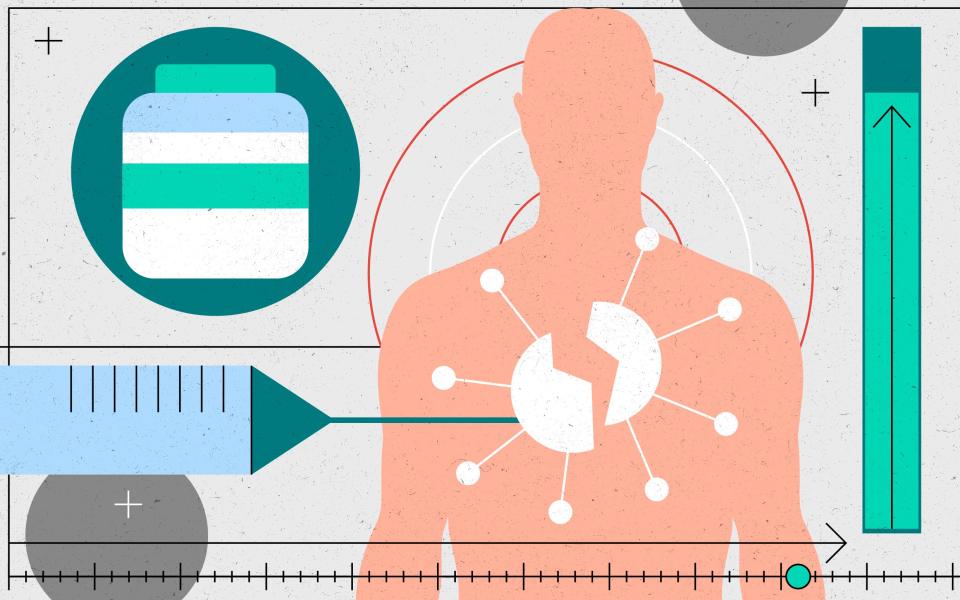Questor: vaccine makers’ shares suffer big declines – we discover why


“Buy on weakness,” we suggested last month in relation to CureVac, the vaccine maker. Well, there has been plenty of weakness: the shares stand 25pc below where they were when that column appeared.
It is not the only vaccine maker to suffer a severe fall in its share price over the past few weeks. BioNTech, whose technology lies behind the Pfizer vaccine, has suffered a 20pc fall since mid-February and Moderna’s shares are 28pc lower over the same period.
What is going on? Almost everyone on earth wants to get their hands on these companies’ products and countries are fighting over their supplies, so why does no one want their shares all of a sudden?
In Questor’s view, the share price falls have nothing to do with vaccines or these companies and everything to do with shifts in the stock market – shifts, ironically, prompted by the success of those very vaccines.
Investors are clearly lumping the vaccine makers in with technology stocks, or indeed growth stocks more generally, and have conceived an aversion to both on the basis that economic conditions will start to favour “value” stocks instead.

The thinking goes like this. The vaccination programme will in time, despite the slowness of the rollout in many countries, lead to the end of lockdowns and therefore rapid economic recovery. In such circumstances the businesses that experience the greatest improvement are those that suffered the most during the pandemic, such as those in the travel and leisure sectors.
Investors therefore want to put their money into these stocks and they raise that money by selling their growth or tech holdings, which they see as having had their time in the sun.
When economies are static or shrinking, investors are prepared to pay a higher price for the few companies able to grow – tech firms being the most obvious – but they are less inclined to pay up when far more humdrum, and more cheaply valued, businesses are growing as the rising tide floats all boats.
A more technical matter accentuates the trend: investors sense the return of inflation and as a result no longer want to own conventional (non-index-linked) bonds. This pushes up their yields and this increases the “discount rate” that investors apply to investment returns they can expect into the future.
Sign up to our Business Briefing newsletter for a snapshot of the day's biggest business stories
Read Questor’s rules of investment before you follow our tips
The effect is to reduce the present value of those future returns and hence the value of the stocks that will produce them. Those already expensive growth stocks are the ones to feel the effects.
In short, the falls in the vaccine makers’ shares say nothing at all about the quality of these businesses. They remain at the heart of countries’ efforts to extricate themselves from Covid’s grip and can expect to remain there in view of the growing realisation of the dangers posed by mutations of the virus.
We may not relish the need for booster shots every few months but it will do no harm to the prospects of these businesses – and it is the makers of “mRNA-based” vaccines in particular that may be expected to bear much of the load as they are the ones, experts say, that are most easily and quickly adapted to counter new coronavirus strains.
The pandemic has provided the validation that mRNA-based vaccines and therapeutics needed and these firms have bright prospects well into the future.
What then of our tips? As we said, we advised readers in the case of CureVac to buy on weakness and suggest that they do precisely that now. We are very happy to hold BioNTech. We had already taken (very large) profits on Moderna and see little need for readers to hold three firms in the same sector, although some may sense a bargain with the shares at their current price.
Questor says: buy CureVac, hold BioNTech
Ticker: CVAC, BNTX
Share price at close: $88.76, $104.44

Update: AstraZeneca
The only vaccine maker we have tipped not to suffer a severe sell-off is Astra, no doubt because it had never benefited from its vaccine in the first place.
Astra, famously and yet with little appreciation from some quarters, is selling its vaccine at cost. And the mud that is routinely thrown at it, justified or not, hardly helps the market’s perception of the firm.
We tipped it for its intelligent approach to researching new treatments, the opportunities presented by its presence in China and its highly capable boss. We did however say buy on weakness in Astra’s case too so readers should continue to watch the share price for such an opportunity.
Questor says: buy on weakness
Ticker: AZN
Share price at close: £72.89

Read the latest Questor column on telegraph.co.uk every Sunday, Tuesday, Wednesday, Thursday and Friday from 5am.

 Yahoo Finance
Yahoo Finance 